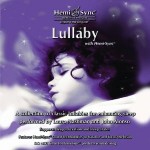 Hemi-Sync has typically been a brand of audio entrainment designed for adults, teens, and children. Recently Lullaby with Hemi-Sync was released as an album specifically for young children and babies.
Hemi-Sync has typically been a brand of audio entrainment designed for adults, teens, and children. Recently Lullaby with Hemi-Sync was released as an album specifically for young children and babies.
While the many adult listeners find relief and help from their soothing sessions with binaural beats possibly for more serious applications like PTSD or insomnia, Lullaby is crafted simply to help a baby return to calm, quiet and sweet slumber.
Everyone knows that young children and babies can have trouble sleeping at night too, so to find a way to get them calmed down can obviously include quality sleep music. Lullaby sleep music can also be the ideal music title to help mask other noisy disturbances in a newborn’s environment.
Recent reports in the news state more families are sharing homes and living spaces with relatives of different generations. Also, starting a family in a crowded home will always pose problems to a young baby at bedtime or nap time since sounds and light can create disturbances in the baby’s sleep cycle and quality of sleep.
Sleep music can help the members of crowded family get the rest and sleep they need, especially when it comes the the youngest ones.
It is also a big responsibility of the parent to resist any temptation to use any medication in their pursuit of creating a peaceful sleep for themselves and their baby. If the parent uses medication for sleeping one must ask if they are breast feeding, will the medication pose any complications for the baby long term?
2 responses to “Baby Sleep Music – Hemi-Sync Lullaby”
Researchers from the University of South Australia did some historical spelunking, looking for every study about sleep duration in children beginning from the end of the 19th century through 2009. They discovered 300 such studies, dating all the way back to a French paper from 1897, and found that both age-specific recommendations for appropriate sleep and the amount of time kids actually spend in dreamland both declined at similar rates: 0.71 minutes per year for recommendations versus o.73 minutes per year for actual sleep duration, according to the study published Monday in the journal Pediatrics. Across the board, children got about 37 minutes less sleep than was recommended.